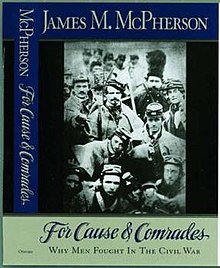For Cause and Comrades: Why Men Fought in the Civil War
 |
|
| Author | James M. McPherson |
|---|---|
| Country | United States |
| Language | English |
| Publisher | Oxford University Press |
|
Publication date
|
1997 |
| Pages | 237 |
| ISBN | |
| OCLC | 34912692 |
For Cause and Comrades: Why Men Fought in the Civil War is a book by Pulitzer prize-winning author James M. McPherson. The book was published by Oxford University Press in 1997 and covers the lives and ideals of American Civil War soldiers from both sides of the war. Drawing from a compilation of over 25,000 letters and 250 personal diaries, For Cause and Comrades tells the story of the American Civil War's soldiers through their own uncensored point of view.
In the book, McPherson contrasts the views of Confederate soldiers regarding slavery to that of the colonial American revolutionaries of the 18th century. He stated that while the American colonists of the 1770s saw an incongruity with slave ownership and proclaiming to be fighting for liberty, Confederate soldiers did not, as the Confederacy's ideology of white supremacy negated any contradiction between the two:
Unlike many slaveholders in the age of Thomas Jefferson, Confederate soldiers from slaveholding families expressed no feelings of embarrassment or inconsistency in fighting for their own liberty while holding other people in slavery. Indeed, white supremacy and the right of property in slaves were at the core of the ideology for which Confederate soldiers fought.
McPherson states that Confederate soldiers did not discuss the issue of slavery as often as Union soldiers did, because most Confederate soldiers readily accepted as an obvious fact that they were fighting to perpetuate slavery, and thus did not feel a need to debate over it:
[O]nly 20 percent of the sample of 429 Southern soldiers explicitly voiced proslavery convictions in their letters or diaries. As one might expect, a much higher percentage of soldiers from slaveholding families than from nonslaveholding families expressed such a purpose: 33 percent, compared with 12 percent. Ironically, the proportion of Union soldiers who wrote about the slavery question was greater, as the next chapter will show. There is a ready explanation for this apparent paradox. Emancipation was a salient issue for Union soldiers because it was controversial. Slavery was less salient for most Confederate soldiers because it was not controversial. They took slavery for granted as one of the Southern 'rights' and institutions for which they fought, and did not feel compelled to discuss it.
Continuing, McPherson also stated that of the hundreds of Confederate soldiers' letters he read, none of them contained any anti-slavery sentiment whatsoever:
Although only 20 percent of the soldiers avowed explicit proslavery purposes in their letters and diaries, none at all dissented from that view.
...
Wikipedia
